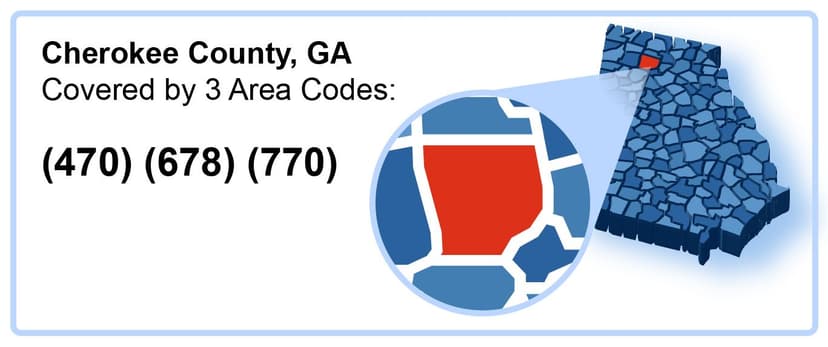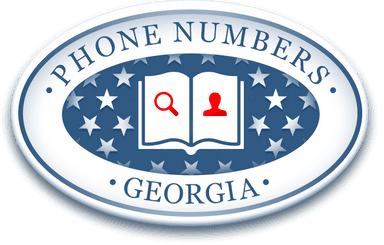What Are the Best Cell Phone Plans in Cherokee County?

Also known as Numbering Plan Areas (NPA), area codes are three-digit codes that begin every North American telephone number. These codes identify the geographical locations (state, county, or city) under the North American Numbering Plan (NANP) where certain calls originated from. Individuals can perform area code lookups using tools that support reverse phone number lookup free of charge. With this, they can determine the originating locations of calls, particularly when they suspect that they have been targeted by fraudsters. Each region in North America under the North American Numbering Plan (NANP) has at least one area code covering it. However, some regions have more than one overlay code due to the exhaustion of the initial area code.
Area Code 470
Area code 470 was created from area code 678 and it became active on February 26, 2010. Some of the cities it covers include Alpharetta, Sandy Springs, Atlanta, Roswell, and Johns Creek. Area code 470 is an overlay for area code 770 and 404 and covers both areas.
Area Code 678
Area code 678 is very similar to 470 and it covers the same areas. It was activated on January 6, 1998.
Area Code 770
Area code 770 was created from area code 404. It got into service on August 1, 1995. Area code 770 serves the suburbs of Atlanta. Some of the cities it covers include Smyrna, Alpharetta, Roswell, Johns Creek, and Marietta. It overlaps coverage areas with area codes 470 and 678.
The top four phone carrier networks with the widest coverage ratings in Cherokee County, are Verizon, T-Mobile, AT&T, and Sprint. Verizon has the best coverage with 98%, followed by T-Mobile with 92% coverage, and AT&T with 90% coverage. Sprint ranks the least with 64% coverage, compared to the other four major phone carriers in the county.
The National Center of Health Statistics survey of 2018 reports that an estimate of 59% of the Georgia adult population aged 18 and above used solely wireless telephones. In contrast, 3.5% of Georgia adults used only landlines for telephony communications. On the other hand, the survey shows that 69.2% of the minors aged under 18 in Georgia used only wireless telephone services, while just 2.7% of the minors solely used landlines. The telephone status survey shows that the adults and minors in the state prefer wireless telephony services to landlines.
Residents and businesses in Cherokee are gradually porting from the traditional phone systems to VoIP. VoIP means Voice over Internet Protocol. It solely uses stable internet connections to transmit voice and multimedia data between two or more entities. VoIP is flexible and is furnished with special features that are relevant to businesses and residents. Even with VoIP’s special features, it is cost-effective compared to the cost of the traditional phone system. Some of the special features VoIP offers include call routing, advanced call management, call analytics, anonymous calling, and call rejection.
What Are Cherokee County Phone Scams?
Cherokee County phone scams are fraudulent practices committed by fraudsters over the phone. The primary aim of such scams is to swindle unsuspecting residents by deceitfully obtaining their personal and financial information or stealing their money through fraudulent schemes. These fraudsters mostly pose as government officials and employees of legitimate organizations such as the Cherokee County Sheriff Department, the IRS, state and local health departments, and financial institutions. The fraudsters sometimes use robocalls and Caller ID spoofing to facilitate their schemes by easily taking on the identities of persons they wish to impersonate. This is why individuals must not rely solely on the Caller ID information displayed during calls. Reverse phone number lookup tools help expose spoofed Caller IDs because when a spoofed Caller ID is put on a phone number lookup, it usually yields no results.
The Federal Trade Commission (FTC) provides measures to educate residents on how to avoid falling victim to illegal Caller ID spoofing and also enable call blocking on their cell phones.
Listed below are common phone scams in Cherokee County:
Cherokee Sheriff's Office Scams
Here, scammers pose as law enforcement officials of the Cherokee Sheriff's Office and request payment for missed jury duties, tickets, warrants, or missed court appearances. These imposters try to scare their victims with threats of arrest and jail time if they refuse to pay or share personal data with them. Note that the Cherokee Sheriff's Office never contacts residents to request payment over the phone. Calls requesting payment or personal information are clear indications of scams. Use free reverse phone lookup tools to identify scammers and block them. Suspected scam calls should be reported to the Cherokee Sheriff's Office immediately they occur.
Grandparents Scams?
Generally, grandparent scams target elderly residents. In these scams, con artists pose as their targets’ grandchildren and claim to need urgent financial assistance for emergencies such as hospital bills, police bail, kidnap ransom, etc. The scammers sometimes request their targets’ personal and financial details for supposed legitimate reasons. Victims of these calls are advised to hang up immediately and not take any rash decisions without first verifying the callers’ story. Calls like these should be reported to local law enforcement agencies close to you. Residents may also conduct suspicious phone number lookups to find out who called them. Phone number lookup tools help answer the question, “who is this number registered to?”
IRS Scams?
Asides from the anxieties that come with tax seasons, IRS scams are also prevalent during these periods. Here, scammers pretending to be IRS officials contact unsuspecting residents and inform them that they owe back taxes to the IRS. These scammers then threaten their targets with arrest, deportation, or revocation of licenses if they do not make immediate payment to them. PayPal, prepaid cards, gift cards, green dot cards, iTunes, bitcoins, and wire transfers are the payment methods scammers mostly request. Note that the IRS never contacts residents without first prompting them of the call with mails. Also, the IRS never requests payment over the phone.
Do not make any payments over the phone if you are contacted in such a manner. In addition, avoid sharing your personal and financial information with anyone over the phone. If you receive any call that you suspect to be an IRS scam, hang up and immediately report this to the Treasury Inspector General for Tax Administration (TIGTA) online or call 1-800-366-4484. You can also conduct a phone number search with a free reverse phone lookup tool to avoid falling victim to such scams.
What are Charity Scams
Charity scams are generally targeted at benevolent residents who regularly make donations. These scams mostly occur during or after disastrous events such as earthquakes and pandemics. Charity scams involve con artists posing as legitimate charity organizations and soliciting donations for seemingly good causes. These con artists embezzle the donations they get and cut off contact with the donators. In some cases, the con artists spoof the Caller IDs of legitimate charity organizations, making it appear as if the calls are legit. It is important that residents do not always trust their Caller ID information. They are encouraged to use phone number search tools to verify the authenticity of these calls and also verify charity organizations before making donations to them.
What are Robocalls and Spam Calls?
Robocalls are pre-recorded calls sent to several persons with computerized autodialers. While robocalls are meant to be strictly informational, some contain directives for recipients to connect with live agents. Such robocalls should not be trusted as they mostly aim to advertise nonexistent or fake products or services, swindle the recipients, or steal their personal and financial information. In other cases, the directives may be for recipients to press certain numbers to stop receiving the robocalls. However, in the real sense, the intention is to identify active phone numbers and target them with more robocalls.
The Federal Communications Commission regulates robocalls in the U.S. and directs that only robocalls that were placed with the recipients’ prior consent are authorized. Hence, robocalls received out of the blue are considered illegal and may be categorized as spam calls or likely scams. Spam calls refer to unsolicited calls sent to advertise, proselytize, or disseminate messages that the receivers are not interested in. The FTC encourages residents to report illegal robocalls through the online complaint assistant. However, the FTC permits certain robocalls to be placed without prior consent. They include:
- Solely informational robocalls
- Robocalls for debt collection purposes
- Robocalls sent by legitimate charitable organizations, political parties, and legitimate health institutions
Use these guidelines to avoid receiving illegitimate robocalls and spam calls:
- End the call as soon as you discern that you have answered a robocall. Also do not follow the directives given during the call.
- File a report with the FTC’s online complaint assistant if you receive such calls or contact 1-888-382-1222 to report over the phone.
- Flag and block robocalls using reverse phone number lookup tools or contact your phone network service provider for call blocking options.
- Include all your phone numbers to the National Do Not Call Registry to curb robocalls and other unsolicited calls.
How to Spot and Report Cherokee County Phone Scams?
Scammers always come up with new ways to scam residents. They sometimes take advantage of widespread issues, such as pandemics and tax payment seasons. Despite this, certain techniques are generally common to phone scams. They include:
- Calling with spoofed Caller IDs - Make sure to always conduct reverse phone number lookups to ascertain the authenticity of the Caller ID you were called with. If the reverse phone number search field does not show any search results after a phone number search, it is an indication that the Caller ID was spoofed.
- Sounding urgent - Hang up immediately and do not allow yourself to be put under pressure. Note that no government agency or legitimate organization ever calls with a sense of urgency to try to cajole you into making a decision without ample time to decide.
- Asking for recipients’ personal details - Do not respond to such requests, instead, get the caller’s identity by conducting a phone number search and report the call.
- Telling recipients to pay- Ignore such requests no matter who the scammer claims to be. Legitimate entities and government agencies do not request financial information or payment over the phone. End the call and report this to the closest law enforcement agency to you. Note that payments made via prepaid cards, wire transfers, gift cards, bitcoins, and cash are not traceable, and processing a refund may be impossible.
- Refusing to identify themselves when they call - Ask questions to get to know who they are and if they refuse to answer, hang up, and do a suspicious phone number lookup to find out who called you.
Cherokee County residents can report phone scams to these government agencies:
Cherokee County Sheriff Department - You may call the Sheriff Department at 678-493-4200 to report or visit 498 Chattin Dr, Canton, GA 30114 to report in person.
Georgia Department of Law’s Consumer Protection Division - The department highlights specific ways on how to file a complaint. They include -
- Online with the Consumer Complaint Online Form
- By mailing or faxing a completed Consumer Complaint Form to 404-651-9018
- By calling 404-651-8600 or 1-800-869-1123 (toll-free in Georgia, outside of the metro Atlanta calling area). The phone lines are open Monday through Thursday, between 8:30 am and 5:00 pm, and on Friday, 8:30 am and 4:00 pm.
Federal Communications Commission - Lodge a report by completing the online complaint form.
Federal Trade Commission - Lodge a report, using the FTC’s online consumer complaint assistant.
